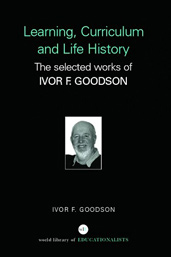Learning, Curriculum and Life Politics: the selected works of Ivor F. Goodson
On Curriculum Form
Sociologists of education interested in the school curriculum have long faced a paradox. The curriculum is avowedly and manifestly a social construction. Why then in so many of our studies of schooling is this central social construct treated as a timeless given? In particular why have social scientists, traditionally more attuned than most to the ideological and political struggles which underpin social life, themselves largely accepted the ‘givenness’ of the school curriculum? This was always a peculiar omission but as the curriculum wars rage in American higher education over the choice of 'canon' it would seem to be a good time to begin again to theorise the school curriculum.
At the moment, in many Western countries the school ‘curriculum’ is back on the political agenda. In the US following the Holmes Group and the Carnegie Task Force and publications such as a ‘Nation at Risk’, this is clearly evidenced; in Britain the givenness of curriculum is being literally enshrined by parliamentary legislation in the form of a ‘National curriculum’; in Australia the provinces are ‘mapping’ their curriculum to discern commonalities, some scholars would argue, as a precursor to defining more ‘national’ curriculum guidelines.
In these circumstances it is important to review the state of sociological knowledge with regard to the curriculum. For our knowledge of the school curriculum remains severely under-theorised. Much of the work in this domain has been that carried out by sociologists of knowledge but pioneering work in this area remains partial and flawed if we are concerned to develop our theoretical understanding of curriculum. As Apple (1979, p. 17) has conceded, a good deal of the significant work in this field has been conducted in Europe: Emile Durkheim's and Karl Mannheim's early work remains important as does the work of the late Raymond Williams and in the 1960s and 1970s the work of Pierre Bourdieu and of Basil Bernstein. In the work of Williams, most of the theoretical focus was on the content of the curriculum, Bernstein meanwhile pointed to underlying principles for the classification and framing of curriculum but placed his emphasis on the relationship between subject content (Bernstein 1971). Interestingly the obsession with subject content is continued in Lee Shulman's work on the knowledge base required for teaching. In his leading section on ‘scholarship in content disciplines’ we learn that “the first source of the knowledge base is content” (Shulman 1987, p.8).
The issue of relationships within subject matter has remained unexplored and untheorised. In this chapter the question of the internal relations of curriculum - the form of curriculum - is analysed: as Apple has said, "for methodological reasons one does not take for granted that curricular knowledge is neutral. Instead, one looks for social interests embodied in the knowledge form itself." (Apple 1979, p.17). The social conflict within the subject is central to understanding the subject itself (and hence relations between subjects). The subject is not a monolithic entity and hence analyses, which view subjects and relations between subjects in this manner, mystify a central and ongoing social conflict. On this analysis an understanding of the internal relations of curriculum would be an important precursor to the kind of work Bernstein has exemplified on the external relations and modalities of curriculum.
